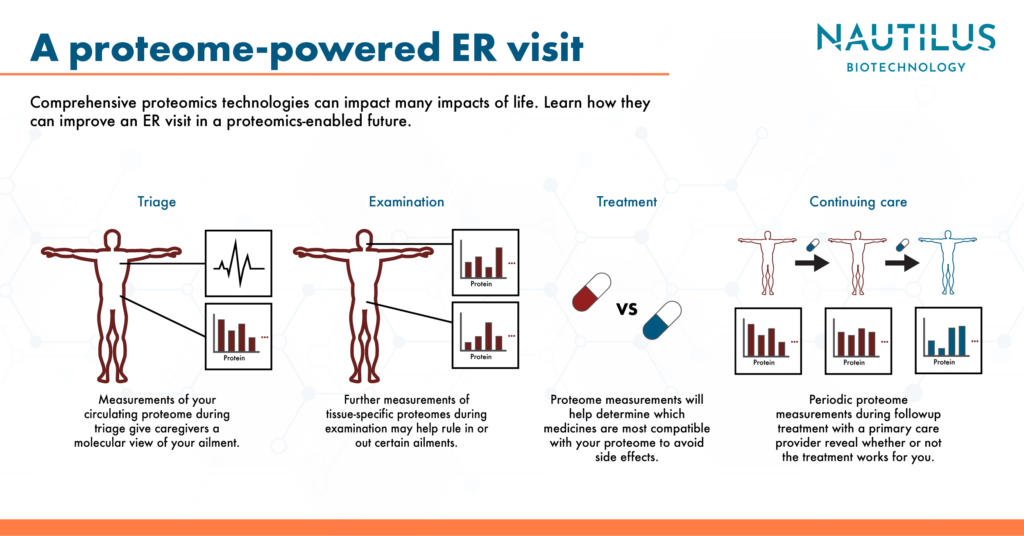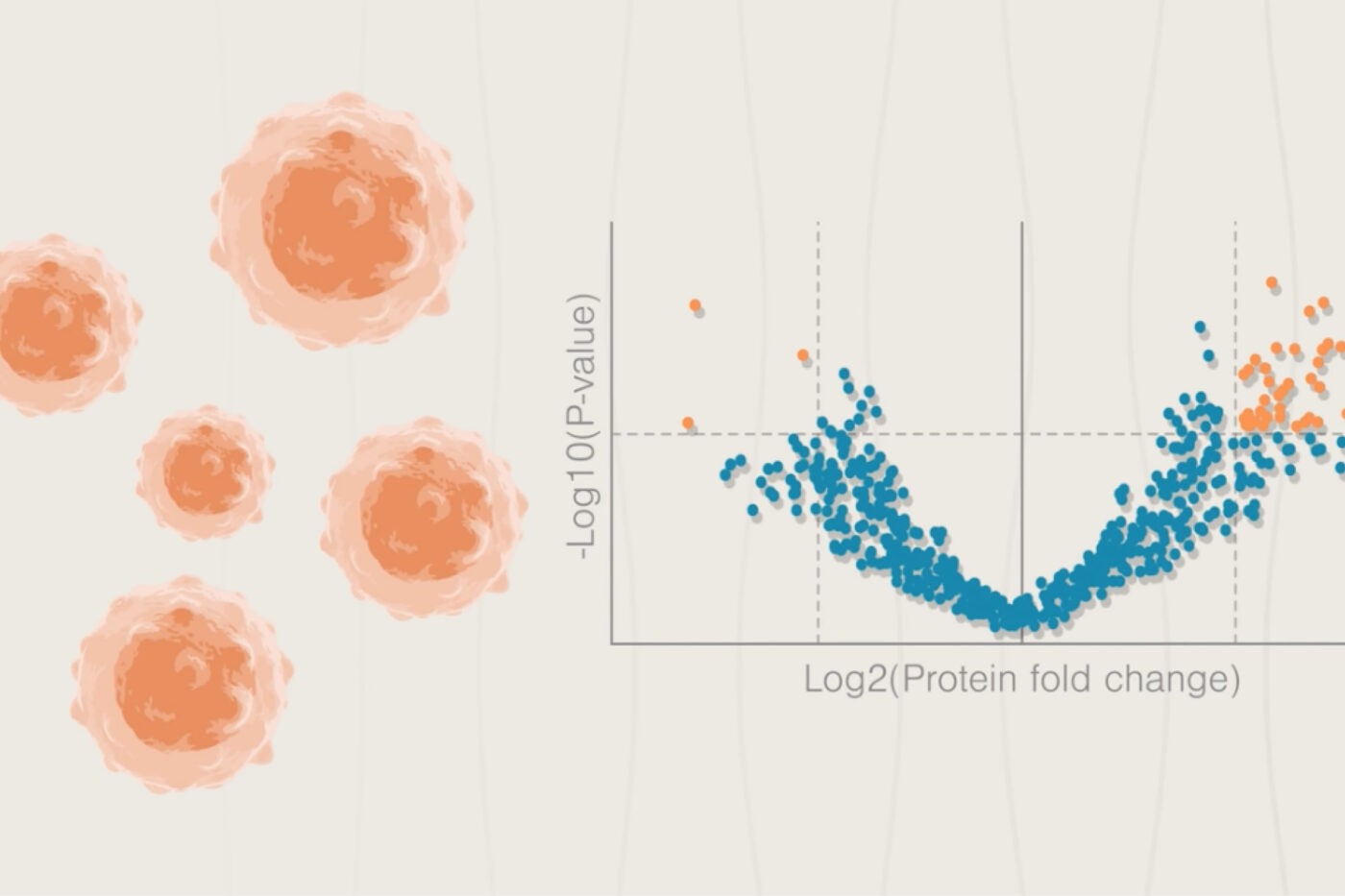
Proteomics is the study of proteomes, collections of all the proteins in a biological entity. From disease research, to drug development, to diagnosis, to treatment, and even the patient experience, the broad adoption of proteomics has the potential to revolutionize medicine.
In this post, we give you a glimpse into the proteomics-enhanced future as we walk through a proteome-powered emergency room (ER) visit. Of course, no one wants to go to the ER, but comprehensive proteomics data may give ER workers the ability to expedite care and improve treatment outcomes through impacts at every step of the ER visit and beyond.
Triage and registration
You’ve just experienced excruciating chest pain and, though the immediate pain has subsided, you think it wise to go to the hospital ASAP. When you enter the ER, a hospital technician or nurse takes your vitals, asks what’s ailing you, and registers your visit. They compile an overview of your symptoms and history to determine how urgent your visit is and prioritize your care relative to other patients.
With technologies that make rapid assessments of the proteome, taking a patient’s “vitals” could involve getting a snapshot of their proteome in addition to other standard measures like blood pressure and heart rate. As fluctuations in protein levels determine cellular health and disease, a quick look at a patient’s circulating proteome could identify protein “biomarkers” of various ailments. This could help the triage nurse quickly distinguish between chest pain caused by a heart attack or a relatively innocuous bout of heart burn. Health events like these would likely release characteristic proteins into the blood stream.
The simple act of patient registration could also be vastly improved through proteomics. Registration might one day pull up health records with proteome-determined levels of risk for various diseases or conditions. A patient’s particular proteome-based risk factors may then point to the need for more immediate care or point clinicians toward the likely cause of symptoms.
Treatment
Given your own personal history of high blood pressure and elevated levels of protein biomarkers indicative or heart disease, you get an ER room relatively quickly. In your room, a doctor fully examines you.
In a proteomics-enhanced future, this examination would use knowledge of your circulating proteome, proteomics records, and measurements of tissue-specific proteomes to guide treatment. In your particular case, a more thorough look at the proteome of a blood sample might be enough for the doctor to rule in or rule out a heart attack. Further assessments of your proteome might clue the doctor in to the best treatment for your case. For example, if the doctor needs to put you on heart medication as a result of your visit, they might see that your proteome profile indicates you will have an adverse reaction to a particular medication. Thus, you ER doctor might prescribe you a different medication that’s more compatible with your proteome.
Proteomics measurements of tissues or biological samples taken during examination might also reveal biomarkers indicative of the molecular mechanisms underlying your condition. For instance, your doctor might find elevated levels of proteins associated with “bad cholesterol” and have evidence that elevated cholesterol levels whether due to diet or genetics might be the cause of your heart problems.
Discharge and continuing care
With a better understanding of what caused your heart pain, your ER caregivers can give you more peace of mind knowing they have confidence in your treatment plan. Once you’ve gotten your initial treatment in the hospital, your care team might keep you in the hospital for a brief observation period, check your vitals, and release you once you’ve stabilized. Proteome measurements would provide more detailed information on whether you’ve stabilized at the molecular level. These measurements would help your doctors see if they’ve treated the molecular cause of your ailment and pushed you back toward your proteomic baseline or if only your superficial symptoms have cleared.
If you need longer-term treatment or medication and must follow-up with your primary care provider, they can continue to use proteome measurements to make sure your treatment is going as planned. If protein biomarkers fail to return to healthy levels throughout treatment, they may decide to change your treatment plan or dive deeper into your proteome data to see if there are any alternative causes for your ailment.
For example, in the incredibly unfortunate situation that you did have a heart attack and were put on heart medication, your primary care provider might use periodic proteome measurements to assess whether a heart medication is working for you, what your risk for heart failure might be, and what other conditions you might have that led to your heart attack. While many of these measurements have been possible in the past, they could all be performed in a more comprehensive and efficient way with accessible proteomics technologies.
Importantly, in this proteomics-powered future, many of the biomarkers indicative of various ailments will have been discovered through the use of novel proteomics technologies in basic and clinical research settings. In addition, proteomics data gathered in the clinic can be leveraged to establish new biomarkers and thereby continuously improve patient care.
As the person visiting the ER or primary care facility, you probably wouldn’t know that proteomics measurements were being done. You would just see your ailments get diagnosed more rapidly and your treatments proceed more quickly and effectively. In the theoretical scenario above, your triage nurse might even be able to rule out heart attack through your initial proteome measurement.
Better hospital care through the power of the proteome
In the future, proteomics has the potential to seamlessly integrate into patient care, reduce hospital stays, improve treatment outcomes, and lower costs while also generating new data that can be used to identify novel biomarkers and point researchers in the direction of new drug targets. Proteomics truly has the potential to upend standard care and accelerate clinical development. Accessible proteomics technologies, like the platform being developed at Nautilus, aim to get us to this proteome-powered future.
MORE ARTICLES


